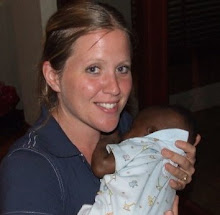I'm never going to be on Larry King Live and I'm thankful for that. Dr. Mohler does an amazing job at it and I'm glad he does. I do think it is fun though to listen to Larry's questions and think about how I might answer if I were in that position.
For example, take last night's discussion about homosexuality.
Larry King asks:
"Reverend Mohler, how could something be a sin if you didn't choose it?"
For Dr. Mohler's powerful response check out the transcript of the show.
If I were in his shoes, I might say:
Without even diving into whether or not homosexuality is a choice, if we just accepted the idea that we don't really have any control over our desires and that those desires can't be changed, Larry you believe that something can be wrong even if you don't choose it.
Gambling.
A husband takes all of his family's money and spends it in Atlantic City and his famiy ends up on the street. Let's pretend like that desire wasn't a choice. He doesn't know why he loves gambling so much, he just gambles. You can't tell me you wouldn't look at that action and say that was wrong.
Child molestation.
A man has desires for children. He might say he didn't ask to be this way. Is that wrong? Larry, you know you would say that desire isn't right.
It's not a question of whether or not we say that a desire can be wrong, even if a person didn't choose it, it's what desire and who gets to say that it's wrong. I don't think I have that right. I believe however since God created us and God owns us, that He does.
But even beyond that, to come back to the idea of choice, personally, I think one of the most unloving, uncompassionate things a person could possibly say would be to say that homosexuality wasn't sin - that it was just the way a person was and there was nothing that a person could do about it. Because you see that statement speaks not only to the person who struggles with homosexual desires, it also speaks to the person who struggles with desires for alcohol, to the person who struggles with desires to gamble, to the person who struggles with any other harmful sexual desire. And you know what it says to them? It says you have to be all your bad desires. You have a desire that is going to harm you, that is going to hurt your family, you are that desire. It isn't a choice and it isn't sin. It is something you even through God's power can do nothing about.
I am so glad that by God's grace I don't have to be all my bad desires that I've ever had; and that when I speak to a person who struggles with any sinful desire, that while I don't want to minimize how strong that desire might be, I can say that God is greater, stronger and that through Christ they can experience victory in their lives over those desires.
Friday, June 16, 2006
Getting to Know Your Hero
We all want a chance to meet our heros. But, probably not like this.
Ian Shaw tells the story of Andrew Reed, who was profoundly affected by George Whitefield and had the opportunity to visit his gravesite.
"In England Reed had preached from pulpits in which Whitefield himself had stood, seen his books and sat on his chairs, but none of this was to prepare him for just how close to Whitefield he was to find himself in America. His party was led down into the vault in which Whitefield was buried, where stood three coffins, that of Whitefield in the middle. His host, as was the custom of the time, then slid back the lid and there before his eyes was the skeleton of George Whitefield himself, Reed's great hero of his youth. He had hardly recovered from his surprise at this sight when his host leant into the coffin, lifted out Whitefield's skull, and handed it to Andrew Reed as the honoured guest! With characteristic understatement, Reed recorded his shock: "I could say nothing, but thought and feeling were busy."
(The Greatest is Charity, p.152)
Ian Shaw tells the story of Andrew Reed, who was profoundly affected by George Whitefield and had the opportunity to visit his gravesite.
"In England Reed had preached from pulpits in which Whitefield himself had stood, seen his books and sat on his chairs, but none of this was to prepare him for just how close to Whitefield he was to find himself in America. His party was led down into the vault in which Whitefield was buried, where stood three coffins, that of Whitefield in the middle. His host, as was the custom of the time, then slid back the lid and there before his eyes was the skeleton of George Whitefield himself, Reed's great hero of his youth. He had hardly recovered from his surprise at this sight when his host leant into the coffin, lifted out Whitefield's skull, and handed it to Andrew Reed as the honoured guest! With characteristic understatement, Reed recorded his shock: "I could say nothing, but thought and feeling were busy."
(The Greatest is Charity, p.152)
Thursday, June 15, 2006
Check out a new blog at...
Africabound...one family's journey to serve Christ by serving the church and helping orphans in Africa.
Wednesday, June 14, 2006
Subscribe to:
Comments (Atom)

